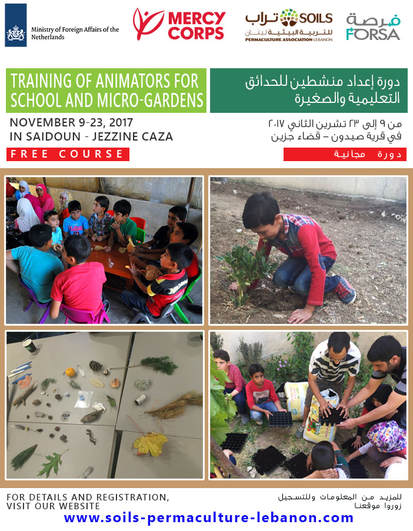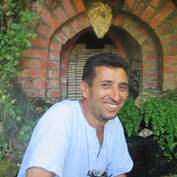
Training of Animators for School and Micro-gardens | November 9-23, 2017
Saidoun (Jezzine - South Lebanon)
(Sponsored Training - Free of charge)
SOILS Pemaculture Association Lebanon is proud to organize the Training of Animators of School and Micro-Gardens in collaboration with Mercy Corps, within the FORSA project, with funding from the Ministry of Foreign Affairs of the Netherlands.
About the Training of Animators
This 2-week residential training course aims to equip young graduates with the necessary tools and knowledge to work as animators of learning gardens in different contexts (schools, refugee camps, or rooftops/balconies in urban areas). The trainees will be able to design and accompany children and adults in setting up small gardens and taking care of them, based on the principles of permaculture and agro-ecology.
Dates: November 9-23, 2017 (including 2 days off)
- November 8 (evening): Arrival in Saidoun
- November 9-20: Training
Lunch from 1:00 p.m. to 2:00 p.m.*
Afternoon sessions from 2:00 p.m. to 6:00 p.m.
Dinner at 6:30 p.m.*
- November 21-22: Days off
- November 23: Site visit, Bekaa
*Lunch and Dinner will be provided for all participants by the people of Saidoun for the duration of the training (November 9-20)
Location: Saidoun (Jezzine caza - South Lebanon)
Languages: Arabic (with occasional sessions in English)
Accommodation: Trainees will be hosted in furnished rooms in the old building
of the Saidoun public school, or in guest houses in the village.
The deadline for registration is October 30, 2017 - Deadline extended to November 2, 2017
Participation in the training is free of charge.
Download the REGISTRATION FORM from the link below and email it to:
[email protected]
Eligible applicants will be invited to attend an info session during the first week
of November (date and location to be confirmed).

Who Should Participate?
Skills to be acquired
Program
A. Introduction to permaculture and agro-ecology
B. School gardens:
· The concept of outdoor classroom
· The benefits of school gardens
· Understanding local school curricula
· Designing activities for different age groups
· Planning for and designing school gardens in a participatory approach
· Planting methods and containers
· Observing the different elements of a garden: soil, water, insects, pests
· Seed harvesting and preservation
· Communication with the schools
C. Micro-gardens in refugee camps/vulnerable communities:
· Selection and assessment of the site
· Design of micro-gardens and training program
· Choice of containers and their preparation
· Crop selection and combination
· Managing fertility and pests
· Indicators
· Working with refugees and vulnerable communities
· Case study
D. Rooftop / balcony gardening:
· Site conditions and sectors
· Water supply and drainage
· Planters and planting medium
· Plant selection
· Case study
Meet the Instructor
Saad Dagher (Palestine)
Saad is an agronomist and environmentalist specialized in agro-ecology. He has over 25 years of experience, particularly in nature restoration and water retention landscape techniques. Saad introduced agro-ecology in Palestine 15 years ago, converting the village of Farkha in the West Bank into the country’s first eco-village and is now working to bring this concept to two other villages.
As a member of the Sharaka group, a Palestinian voluntary group that supports Palestinian farmers in marketing their products directly to consumers, he helped establish the first community-run eco-farm in Palestine last year. He also recently launched his own agro-ecological farm (The Humanistic Farm). Previously, Saad was the director general of the Arab Agronomist Association (a Palestinian NGO) and made agro-ecology the main goal of the association.
In addition to his work in agro-ecology, Saad is a yoga teacher, an agro-ecological farmer, and a beekeeper.
* Others facilitators will be leading specific sessions (names to be confirmed).
- Recent graduates in one of the following majors: Agriculture Engineering, Landscape Design, Environmental Sciences, Education. Priority will be given to the Lebanese University graduates.
- Age group: 21 - 28 years old.
- Applicants should be able to commit to the whole training period, should not have a full-time job, and should be interested in working as garden animators in the future.
Skills to be acquired
- How to design a learning garden with children
- How to set up micro-gardens in refugee camps or urban areas
- Designing training programs on gardening for children and adults, adapted to different contexts
Program
A. Introduction to permaculture and agro-ecology
B. School gardens:
· The concept of outdoor classroom
· The benefits of school gardens
· Understanding local school curricula
· Designing activities for different age groups
· Planning for and designing school gardens in a participatory approach
· Planting methods and containers
· Observing the different elements of a garden: soil, water, insects, pests
· Seed harvesting and preservation
· Communication with the schools
C. Micro-gardens in refugee camps/vulnerable communities:
· Selection and assessment of the site
· Design of micro-gardens and training program
· Choice of containers and their preparation
· Crop selection and combination
· Managing fertility and pests
· Indicators
· Working with refugees and vulnerable communities
· Case study
D. Rooftop / balcony gardening:
· Site conditions and sectors
· Water supply and drainage
· Planters and planting medium
· Plant selection
· Case study
Meet the Instructor
Saad Dagher (Palestine)
Saad is an agronomist and environmentalist specialized in agro-ecology. He has over 25 years of experience, particularly in nature restoration and water retention landscape techniques. Saad introduced agro-ecology in Palestine 15 years ago, converting the village of Farkha in the West Bank into the country’s first eco-village and is now working to bring this concept to two other villages.
As a member of the Sharaka group, a Palestinian voluntary group that supports Palestinian farmers in marketing their products directly to consumers, he helped establish the first community-run eco-farm in Palestine last year. He also recently launched his own agro-ecological farm (The Humanistic Farm). Previously, Saad was the director general of the Arab Agronomist Association (a Palestinian NGO) and made agro-ecology the main goal of the association.
In addition to his work in agro-ecology, Saad is a yoga teacher, an agro-ecological farmer, and a beekeeper.
* Others facilitators will be leading specific sessions (names to be confirmed).

